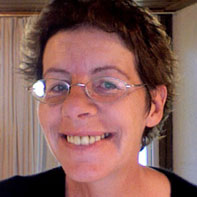Professional Master at the Centre of African Studies
 Clare MacCarthy is doing a Professional Master at the Centre of African Studies with Development Aid as her main subject. She is 50 years old, was born in Ireland and has been working as a journalist in Denmark since 1986.
Clare MacCarthy is doing a Professional Master at the Centre of African Studies with Development Aid as her main subject. She is 50 years old, was born in Ireland and has been working as a journalist in Denmark since 1986.
Why did you choose African Studies?
I’ve worked as a journalist everywhere from Ritzau, The Financial Times, The Economist, The Irish Times and at every radio station in the world that would put me on air. Mostly I’ve been doing financial reporting and company reporting, but in the last ten years it has been more political and society and now I’m moving into development, which is why I decided to do this course.
The Economist send me to Ghana 18 moths ago to the U.N. High-Level Forum on Aid Effectiveness in Accra and I did a full page article. It was tricky for me to do because I didn’t have the background. I basically had to stay up all night and learn about development so I could do the article. But then I decided that the area was so fascinating that I wanted to write and broadcast more about it.
I needed to address the subject in greater depth and to access the theoretical tools to allow me set problems in their proper context.. As to the practical use of the course - even though I’m only half way through, it’s already proving useful. I was in Brussels recently for a special seminar for European journalists on `Development Aid Going Green´ which just so happens to be the title I had already picked out for my thesis! We had sessions with senior people from the Commission and members of the European Parliament and people from NATO and various other academics and public representatives. Because I had learned so much in my first three months at CAS I was able to ask much smarter questions that I could 18 months ago when I went to Accra. So it has already paid off. This dynamic in beneficial both for myself and for the people I interview – when you have in-depth knowledge of your field people are much more approachable and willing to open up.
So the studies help you to ask the smart questions but do the degree also matter in some official aspects of your work?
Yes, it increases my credibility. Some people would be more willing to talk to me and treat my work seriously if they realise that I have a sound academic qualification behind it and I’m not just a very general journalist. This is definitely the primary advantage for me. Plus the fact that I learn more myself; I can prove that I know my stuff. I meet somebody and we can get right to the point, they don’t have to fill in so much on the policy or structure or background, we can go straight to the topic I’m interested in and this increases efficiency. It’s a problem for civil servants and policy makers and law makers that the journalists interviewing them are often lightly informed and need an awful lot of background, so it just makes things easier.
How are you planning the course of your degree?
I’m doing it all in one year, so I took two courses in spring and I’ll take two more in the autumn simply because I want it done and it’s possible. It’s maybe 20 hours a week and that leaves another 40 hours to work in if I need it. I tend to work an awful lot of hours anyway, and I work all sorts of strange hours, so I can fit things in. My family is very used to having me work all weekend, so it’s not a big change.
What are you working on right now?
I’m going to Ghana in November to make a radio documentary and an article series about a world food programme that encourages kids into school in northern Ghana. `Food for Thought´ is the name for my project, and it’s about this programme that is giving the kids one meal a day and food for their families at home so the families don’t miss the income on the farm. Northern Ghana is Muslim so there has been traditionally very low female school attendance, but now girls have the highest female school participation rate in Ghana, so it’s development aid that works in practice.
Development aid is a hugely important area and like anything else that’s that big with that amount of money in it, it needs journalists to address it seriously because in a lot of the financial coverage there is very little about Africa and African development in general. What you tend to see are stories about poor little starving children and corrupt governments and flooding and disasters and humanitarian catastrophes – it’s always the negative. There’s a great deficit of positive stories in newspapers and my aim is to help change that situation. It’s why I’m going to Ghana - to show that development can work if it’s done properly. Unless the topic is kept in the newspapers and on the radio waves people will forget about it - especially in times like these when we are under economic pressure at home.
